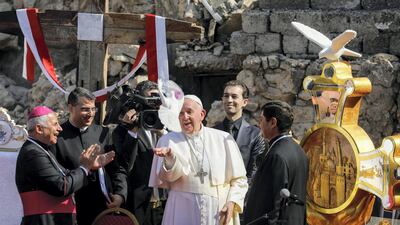In cities like Mosul, entire neighbourhoods remain just rubble. Even in the capital, many Iraqis have been living for years with crumbling buildings and potholed streets.
But, in a bid to make a good impression on Pope Francis, Iraqi authorities rushed to rebuild, redecorate and restore and in the process showed Iraqis a country that could be.
It also sparked a wave of cynicism and even anger.
Before the visit, streets were repaved and lined with flowers and plants, vibrant murals were painted on bleak grey blast walls around churches and public buildings and for the first time, Iraqis saw the Great Ziggurat temple of Ur lit up at night.
“No need to rush Baba, we are waiting for you,” one Facebook user said.
But that raised questions – why, after years of waiting, did it take the Pope visiting to spur action.
“Just in a period of two weeks, we have seen streets paved and cleaned, buildings rehabilitated and painted, street lights fixed, parks rehabilitated with new plants and fountains.
“This is proof that they are capable of doing anything in a very short period of time."
Then, within a few hours of the pontiff’s plane taking off from Baghdad airport to return to Rome on Monday, municipal authorities started to undo their hard work.
The power generator that lit Ur at night was back on a flatbed, even the bedding plants lining streets were dug back up and taken away.
Mosul activist Ali Y Al Baroodi shared pictures on Twitter showing how bleak the city’s streets looked once the greenery of the plants, trees and flowers were gone.
Mr Al Baroodi said Mosul Mayor Zuhair Al Araji assured that the flowers had only been removed temporarily. But in a city ravaged by war and that has suffered years of neglect, it did little do assuage public anger.
A glimmer of hope
The visit and the atmosphere it created brought optimism to Iraqis who have suffered from political wrangling and deteriorating living conditions since 2003.
“I’m optimistic because the message was loud and clear from the Pope,” Baghdad resident and activist Mustafa Abid told The National.
He took part in anti-corruption protests in Iraq in October 2019.
“I’m sure there will be good results for the country, mainly in terms of bringing peace,” Mr Abid said.
“But I’m not counting on the government in this. Instead, the society and the people who will interact positively with the calls made by the Pope."
He said the government and political parties wanted to exploit the visit to “polish their pictures” before elections in October.
“One of their tricks is to call for holding a national dialogue conference where the politicians, who are part of the country’s problems, will sit,” he said.
“If the government is serious, it knows what the people need and from where it should start. It needs to stop foreign intervention first and to improve the people's living conditions through offering services and jobs."

















